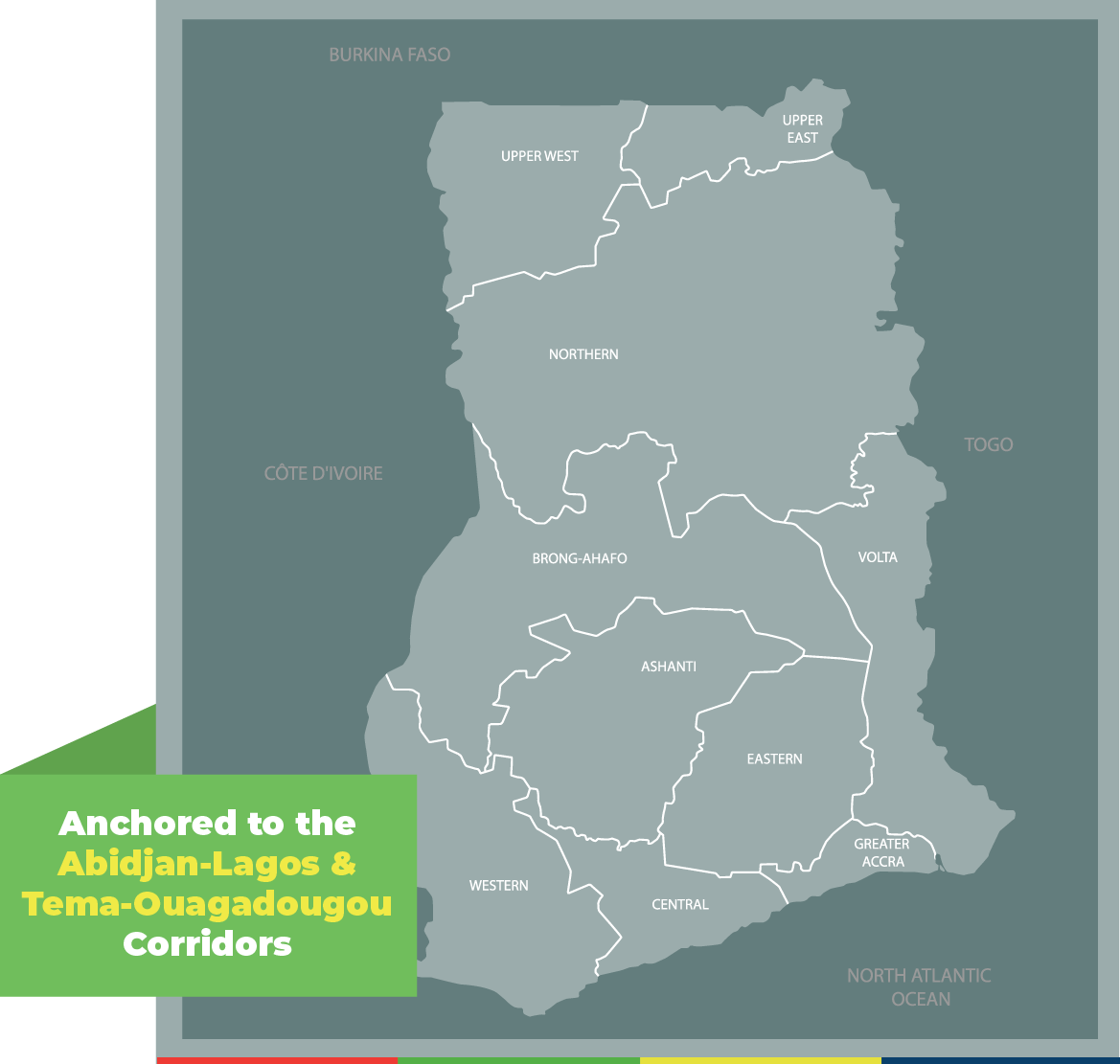Quick Stats
Ghana
34 Million (2024)
$83 Billion (2024)
Year
2023
Abidjan-Lagos & Tema-Ouagadougou
Gold (57%), Crude Petroleum (19%), and Cocoa Beans (4%)
- Population and GDP size- World Bank Data – https://data.worldbank.org/indicator
- Trade- OEC- https://oec.world/en/profile/country/
Ghana is one of West Africa’s most strategically positioned economies, leveraging its Atlantic coastline and regional trade links with borders neighbouring Togo, Cote d’Ivoire and Burkina Faso.
239,567 sq kms
34.8 Million people
Since 2017, the Government has pursued a 10-point Industrial Transformation Agenda anchored in national strategies, including the Micro, Small and Medium Enterprises (MSME) Policy, the National Export Development Strategy, the AfCFTA Policy Framework, and the National Quality Policy. Flagship programmes, such as One District One Factory (1D1F) and Business Resource Centres signal a decentralised approach to industrial growth, with the goal of establishing at least one major industrial enterprise in each of Ghana’s 261 districts.

While the economy remains reliant on gold, cocoa, oil, and gas exports, services sectors, such as digital, financial technology and education, are expanding rapidly. The Government aims to grow non-traditional export value from $3 billion in 2020 to over $25 billion by 2029, targeting strategic sectors such as automotive assembly, pharmaceuticals, industrial starch, aluminium, petrochemicals, and textiles. Accelerating digitalisation and deepening Ghana’s integration into continental and global value chains, particularly through the African Continental Free Trade Area (AfCFTA), will be critical to sustaining this momentum. This is where TMA support begins.
Early Milestones
Since 2023
TMA officially started operations in Ghana in 2023, through a partnership with Ghana’s Ministry of Trade, Agribusiness and Industry, and under the National AfCFTA Policy Framework and Action Plan. The programme supports the government, private sector and civil society to strengthen trade competitiveness and drive inclusive, export-led growth.
TMA in Ghana is designed to: accelerate economic transformation by deploying digital systems, improving trade infrastructure, and raising the quality of traded goods; and to support measures that lower transaction costs and time, strengthen resilience, and foster inclusion across the trade ecosystem.
Focus areas include:
TMA Strategy 3
2023 - 2030
TMA in Ghana is designed to: accelerate economic transformation by deploying digital systems, improving trade infrastructure, and raising the quality of traded goods; and to support measures that lower transaction costs and time, strengthen resilience, and foster inclusion across the trade ecosystem.
Physical Connectivity
Digital Trade Systems
Resilient and Inclusive Trade
Quality and value of traded goods
Women in Trade
Strengthening the Trade and Investment Environment
Working with public and private stakeholders, the programme targets the resolution of 30% reported non-tariff barriers together with boosting export value. Efforts include simplifying trade procedures, strengthening legal frameworks to address trade barriers and readying businesses for exports – from cocoa exporters to small-scale horticulturalists. Upgrades at both the Akanu-Noepe Joint Border Post and the Elubo-Noé One-Stop Border Post, and implementing Integrated Border Management systems, will give Ghana-based businesses easier access to the wider region.
Improving the Quality and Value of Traded Goods
In partnership with the Ghana Standards Authority, the Food and Drugs Authority, and phytosanitary agencies, the programme will support the harmonisation of standards and mutual recognition agreements with key trading partners. Strengthening testing capacity and streamlining certification processes, will reduce compliance costs, helping traders to access high-value markets, thus increasing export value for certified businesses.
Driving Efficiency Through Digital Trade Systems
To reduce border clearance time and customs costs, the programme is supporting the digital integration of customs systems in Ghana. Enhancements to the National Single Window platform, deployment of Smart Gate infrastructure, intelligent clearance tools, and digital inspection and licensing, will all improve the reliability of perishable and time-sensitive goods.
Investing in Physical Trade Infrastructure
In collaborating with the Government of Ghana, work is under way to de-risk and structure public-private partnerships in critical infrastructure, from upgrades at Tema Port and cold chain logistics for agriculture, to garment focused industrial parks. Trade finance solutions, such as supply chain financing and factoring, will address SME liquidity gaps, with the aim of attracting $5 million in additional investment in infrastructure development, including climate aligned capital.
Building a Resilient and Inclusive Trade Ecosystem
In Ghana, women account for around 70% of small-scale cross-border traders (UN IOM, 2024; UNECA, 2023), yet many operate informally and face limited access to finance. Only 19% of women traders operate registered businesses, compared to 22% of their male counterparts, and 22% of women who disclosed their earnings reported monthly revenues of less than $99 (ibid).
Targeted support, such as business formalisation, tailored financial products, and digital platforms like iSOKO is expected to raise incomes of participating traders. Under the Global Affairs Canada (GAC) funded project dubbed, ‘Making Trade Work for Women’ (MTWW)_launched in March 2025
with CECI, some 80,000 traders (70% women) will benefit.

COUNTRY DIRECTOR, GHANA
Based in Accra, Ghana, Mrs Harriet Odembi Gayi leads TMA’s West Africa and AfCFTA portfolio, where she has been instrumental in setting up and steering the region’s programme since its inception in 2023.
Harriet brings to the role over three decades of experience in trade, agriculture, and economic development. Prior to joining TMA, she held senior leadership positions including Deputy Chief of Party for the USAID Feed the Future Staples Project in Tanzania and Director of Agriculture and Agribusiness at the USAID East Africa Trade and Investment Hub. Her earlier career includes key roles within the UN.
Harriet blends private sector know-how with deep policy insight. Her work spans formal and informal trade systems, logistics, and regional integration, with a particular focus on women’s economic empowerment and inclusive growth. She now leads the delivery of high-impact solutions to some of West Africa’s most complex cross-border trade challenges, anchoring her work within the ambitions of the AfCFTA.

